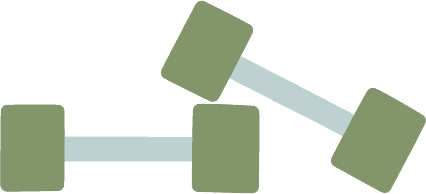Physiotherapy

physiotherapy for infants, children & young people
At Emble, our Physiotherapy team supports infants, children, teenagers, and young adults to move, play, and take part in the daily routines and activities that matter most – at home, in school, at work, and in the community.
For infants, physiotherapy may mean reaching early milestones like taking first steps. For children and teenagers, it could mean joining in play at school, enjoying the playground, taking part in sport, or building skills for independence. For young adults, physiotherapy can support participation at work, in the community, and through neurorehabilitation after injury or illness.
Our physiotherapists focus on what’s most meaningful for each person and their family, embedding strategies into everyday life and routines. Therapy may take place in our clinic, or in the settings that matter most – at home, in childcare, school or work, at the local park, or in the wider community – wherever people live, learn, and participate.
Start Here: Book an Initial Consultation
All new physiotherapy clients begin with an Initial Consultation. This first session helps us understand what matters to you, explore strengths and challenges, and plan supports together.
We accept NDIS (self- and plan-managed only), Medicare, TAC, private health insurance, and private fee paying.
You can select the funding type that best fits when booking; our team will confirm the details with you.
What Physiotherapy Can Support
Physiotherapy can support a person to:
- Build strength, mobility, coordination and balance
- Improve motor planning, endurance and posture
- Participate more easily in play, school, sport and community activities
- Develop functional movement skills for everyday routines
- Increase independence, safety and confidence
- Access adaptive equipment or supports where needed
- Engage in movement experiences that feel enjoyable and meaningful
We offer support across clinic, home, school, childcare and community settings, depending on goals and therapist availability after the Initial Consultation.
Our Approach to Physiotherapy at Emble
For people to be truly included, it’s not just about developing their skills – it’s also about making sure the world around them supports their participation. That’s why our physiotherapists work in partnership with families, carers, educators, medical professionals, and others who are part of a person’s care team. By sharing strategies, reducing barriers, and creating supportive environments, we help individuals take part more fully in the activities and routines that matter most.
At Emble, we also understand that some people require input from more than one professional. With our large allied health team under one roof, we provide wraparound, coordinated care – bringing together physiotherapy, neurorehabilitation, and other allied health supports to ensure every person’s goals are approached in a holistic, practical, and connected way.
Who We Work With
Developmental differences and needs
- Developmental delay
- Late motor milestones (tummy time, rolling, sitting, crawling, walking)
- Coordination and balance difficulties
- Neurodiverse children and teenagers (e.g. autism, ADHD)
Neurological and neurorehabilitation needs
- Cerebral palsy
- Chromosomal or genetic conditions
- Neurological disorders
- Cystic fibrosis
- Acquired brain injury (ABI)
- Stroke
- Progressive neurological conditions (e.g. motor neuron disease, multiple sclerosis)
Orthopaedic & musculoskeletal needs
- Plagiocephaly, brachycephaly, and torticollis
- Hypermobility
- Developmental hip dysplasia
- Musculoskeletal or sports-related injuries
How we Provide Supports
Every person learns and participates differently, so our physiotherapists deliver therapy in ways that are flexible, creative, and matched to what matters most. We use play, everyday routines, and individual interests to keep therapy engaging and meaningful.
Clinic-based therapy
- One-to-one sessions using our specialist equipment and resources
- Group-based programs that build skills in a motivating and social environment
- A safe space to practise and strengthen movement before applying skills in everyday settings
Everyday environments
- Therapy delivered in homes, schools, early learning centres, workplaces, playgrounds, and community spaces
- Strategies embedded into daily routines so skills are used where people live, learn, and participate
- Collaboration with families, educators, employers, and others important in a person’s life
Programs and innovative supports
- Hydrotherapy / aquatic physiotherapy – water-based therapy to build mobility, coordination, and confidence
- Sports, play & recreation – supporting participation, inclusion, and community connection
- Equipment & mobility supports – assessing, prescribing, and supporting walkers, wheelchairs, orthotics, and other aids to promote safe and independent mobility
